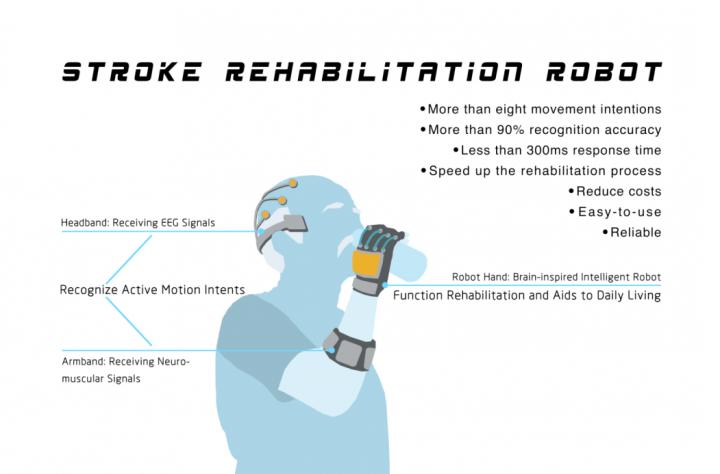
Credit: BrainCo, Ltd.
Strokes, which occur when the blood supply to part of our brain is interrupted or reduced, are the leading cause of death and disability in the adult population. Among the patients who survive, 75% will experience difficulties carrying out daily activities independently and need long-term functional exercises and rehabilitation. But the outcomes using traditional rehabilitation equipment are poor. In addition, the motivation of patients to train is often low.
The Department of Neurology in Tongji Hospital, which is affiliated to Tongji Medical College at the Huazhong University of Science and Technology, is recognised in China for the quality of its scientific research and clinical strength. Similarly, Zhejiang BrainCo, Ltd., incubated by the Harvard Innovation Lab, is a market leader in terms of brain-computer interfaces; considered by many the next generation of artificial intelligence technology.
In the NCyborg Project, the two organisations will draw on their expertise in brain-computer interface technology and brain-inspired intelligent robot technology to establish a stroke rehabilitation process driven by patient initiative. In a paper published in the KeAi journal Brain Hemorrhages, they outline the project’s three focus areas:
1.An algorithm for analysing the movement intention of stroke patients based on brain-computer interface technology.
2. A motion control strategy for a rehabilitation robot based on brain-inspired motion perception.
3.The mechanism of stroke rehabilitation using brain-inspired intelligent robots.
They will begin by training the robot to support rehabilitation of the hand – a body part often left with limited movement following a stroke. The team aims to achieve recognition of no less than eight hand movement intentions with an accuracy rate of ?90% and a response time of ?300 ms.
Co-corresponding author, Jonh H. Zhang, explains: “The project’s goal is to develop an easy-to-use, reliable and affordable stroke rehabilitation robot that will improve the rehabilitation effect for stroke survivors, speed up the rehabilitation process, and reduce the costs involved.”
His co-corresponding author, Bicheng Han, adds: “Our hope is that, within five years, millions of stroke patients will be using this product and see their lives improve.”
According to co-corresponding author Zhouping Tang, the ‘N’ in the NCyborg Project name stands for ‘neural’, while in fictional stories ‘cyborg’ is often “an icon that is enhanced mentally and/or physically over and above the ‘norm’ with technology. In the real word, we believe that NCyborg Project will set up a brand-new stroke rehabilitation pattern which could qualitatively improve the treatment effect for stroke survivors.”
###
Contact the corresponding authors: Jonh H. Zhang [email protected], Bicheng Han [email protected], Zhouping Tang [email protected]
The publisher KeAi was established by Elsevier and China Science Publishing & Media Ltd to unfold quality research globally. In 2013, our focus shifted to open access publishing. We now proudly publish more than 100 world-class, open access, English language journals, spanning all scientific disciplines. Many of these are titles we publish in partnership with prestigious societies and academic institutions, such as the National Natural Science Foundation of China (NSFC).
Media Contact
Cassie He
[email protected]
Related Journal Article
http://dx.




